‘A volcano that exploded’: the ’95 Ajax side that changed European football | Football
Patrick Kluivert has, with the precision that accompanies an Ajax upbringing, just offered a photo-realistic description of the goal that changed European football. Twenty-five years have passed but no detail is spared: the gap into which he invited Frank Rijkaard’s pass; the ricochet that set him teetering as Zvonimir Boban slid in; the instinctive adjustment and extension of a toe that sent the ball rolling beyond Sebastiano Rossi. He knows it by heart but the feelings that came out eight minutes later can be explained more simply. “It was crazy, what happened after the final whistle,” he says. “Everybody was just out of their brains.”
It is, appropriately, a regression to teenage wonder. Kluivert did not know where to run as the bodies flew across the Ernst-Happel-Stadion in Vienna and nothing would be the same. Ajax’s victory over Milan in the 1995 Champions League final, earned by that single prod from the 18-year-old substitute, did not have heralded an era of domination from the Dutch side but its ramifications went further.
Daniele Massaro, who played his last game for Milan that night, says: “After that final, 10 great years ended where we won everything and wrote pages of history in world football.” A new chapter began with Ajax’s young, largely homegrown squad spreading around Europe and becoming its new footballing reference points. They had done it their way under Louis van Gaal, blending Cruyffian technical and tactical wizardry with an accent on physical, athletic dominance to set a template for the modern player. Massaro describes them as “vicious, but also smart and filled with quality”, recalling Jorge Valdano’s famous line. Ajax, the then Real Madrid manager had said, were “beauty and the beast”.
Like most exceptional feats, Ajax’s success arose through a confluence of happy fortune and peerless judgement. “It was like a volcano, an eruption from inside,” says Ronald de Boer, who was among seven academy graduates to play in Vienna. “We didn’t see that it was coming; we had no clue, basically. And then, suddenly, the volcano exploded.”
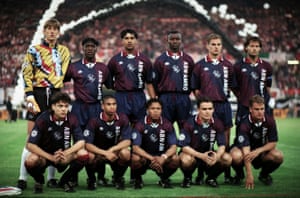
De Boer had his own reasons to feel surprised. Leo Beenhakker had sold him to Twente in 1991, shortly before Van Gaal became head coach, and he admits he “never thought I would return”. It also meant separation from his twin brother, Frank, but Van Gaal knew the pair from his time coaching Ajax’s academy and later as Beenhakker’s assistant. Sometimes he and the De Boers shared lifts to training; the car pool was resurrected in 1993 when Van Gaal re-signed Ronald, a multifunctional attacker, and made him central to a reconfigured squad.
It was a high-wire act from Van Gaal, who had lost Dennis Bergkamp and Wim Jonk to Internazionale and in 1992 had let Bryan Roy join Foggia. Roy, he decided, was not bright enough to fulfil his tactical demands. The players who could were the younger Ajax generation steeped in them, along with outsiders whose skills were not always immediately evident. Jari Litmanen arrived from the Finnish club MyPa and then, in pre-season of 1993-94, came two Nigerians who had never played outside their home country, Nwankwo Kanu and Finidi George.
“We brought Finidi George and a Russian winger, [Youri] Petrov, on a training camp to Finland,” De Boer says. “Van Gaal had to pick one and, if I had to choose, I’d probably have gone for the Russian guy. But he chose Finidi and what a great asset he became.
“With Kanu, you could see he had quality but at first he couldn’t really pass the ball straight and didn’t have a left foot. There was clearly some potential, but where does development stop in a player? By the time he left Ajax, he was just unbelievable. All these guys kept on growing.”
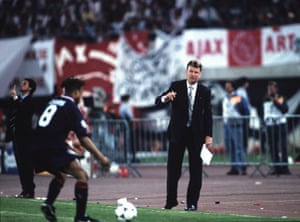
Van Gaalwas hard work, but his methods improved everyone: even Rijkaard, a club legend who had thrived at Milan before returning in 1993. “It was repetition, repetition, repetition,” De Boer says. “Even with Frank. He’d won everything in the game but, like Kanu, he had quite a poor left foot and couldn’t really hit a straight ball with it. Van Gaal had a passing drill that we did every day as an extension of the warmup, and sometimes you’d think: ‘Oh, that again.’ After three months of ‘ping, ping’, Frank’s left was perfect.”
It translated into an Dutch title in 1993-94; while not yet an explosion, evidence of tectonic activity was gathering. Kluivert was promoted to the first-team squad in 1994 after perhaps the biggest sliding doors moment: Ronaldo, who would become arguably the best centre-forward of all time, had joined PSV Eindhoven instead of Ajax and ensured another outstanding talent could blossom.
“It was an unbelievable thing for me, quite huge,” Kluivert says. “I’d been hoping for it. First of all the message was: ‘Go and enjoy yourself.’ But Van Gaal gave me the courage and confidence to become a first-team striker for Ajax.” He joined his near neighbour Edgar Davids and Clarence Seedorf in the senior ranks.
Kluivert started the game that shifted Ajax’s horizons: a 2-0 home win over Milan in their opening group stage fixture. Fabio Capello’s team had demolished Cruyff’s Barcelona in the final four months previously; this time, on a boggy pitch at the Olympic Stadium, they had no answer to a Kluivert-assisted dink from Ronald de Boer and a half-volley from Litmanen. “We were simply surprised,” Massaro says. “They had great creativity; they were so fast and didn’t give us any points of reference. We were disorientated and couldn’t play our game.”
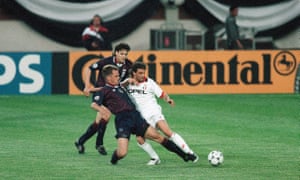
Afterwards, Ajax were, in De Boer’s words, “like little kids” as they managed, with Rijkaard’s assistance, to swap shirts with the idols they had humbled. But two months later they won by the same scoreline in a rematch played in Trieste because of misbehaviour by Milan fans. De Boer beautifully set up Litmanen and Finidi forced an own goal from Franco Baresi; it was, De Boer felt, an even better performance but Massaro says Milan did not sense they had been dethroned. “If I have to be honest, we didn’t think they could win the cup. They impressed us, but not to that level.”
When the final came around, that opinion looked shaky. Ajax had retained their league title and would complete the season undefeated, while in Europe they had been sensational. The 5-2 win over Bayern Munich in the semi-final second leg remains among the best matches in the Champions League era, Finidi and Marc Overmars destroying the Bavarians on the wings. “I can’t remember having any doubt that we could beat them,” De Boer says of their third appointment with Milan.
The same went for Kluivert’s mother, Lidwina. “Before we left for Vienna she said to Van Gaal: ‘Wait a minute, you know my son will score the winning goal,’” Kluivert says. While he had taken the Eredivisie apart, Kluivert was in and out of the Champions League side. He began on the bench in Vienna, with De Boer deployed up front. “I was really pumped up,” Kluivert says. “A bit disappointed of course, but it was understandable that the coach wanted more experienced players in a final. You have to be prepared and I was ready.”
Recently, De Boer rewatched the final. “It was a shitty game, we played very poorly,” he says. “Jesus, how bad was it?” Capello was never going to allow a repeat of Bayern’s evisceration and Milan carried themselves with ominous savoir-faire. Paulo Maldini clattered through Finidi early on. Rijkaard, who would step into midfield to create a 3-4-3 or 3-3-4, was nullified and Ajax’s passing angles were cut off. By half-time Milan had come closest to scoring and in the dressing room Rijkaard spoke first, telling his teammates to raise the tempo. “Frank was not really a talker but when he did, he talked sense,” De Boer says.
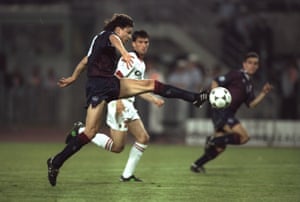
Ajax improved, Rijkaard dropping deeper to see more of the pitch, but the impact was marginal. It was a tedious spectacle, enhanced only slightly when Van Gaal sought to force the issue by sending on Kanu for a below-par Seedorf. Kluivert’s introduction, 20 minutes from time, was another bold step. Watch the footage from 1994-95 and one thing, perhaps above any, stands out: Litmanen was brilliant and, from his No 10 position, consistently unplayable. He had the full package of vision, awareness, strength and lethal finishing. But in the final, Marcel Desailly had barely afforded him a kick. It did not help that he felt unwell and, shortly after he had squandered two good counterattacking positions, Van Gaal acted.
“He told me: ‘Be there as a target man, make sure you’re available but don’t come too much to the ball, try and get into the spaces behind,’” Kluivert says. He was to occupy the centre-backs and Van Gaal’s instructions were heeded after Ajax launched their best attack. It began when Edwin van der Sar punched away Demetrio Albertini’s cross and culminated nine passes later, when Kluivert sprang a bizarrely shoddy offside trap and, by hook or by crook, proved Lidwina right.
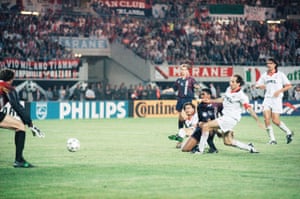
“I ran off and turned my shirt around and my breathing was so high because it was unbelievable to experience that moment,” he says. “Then all the players came to me and I couldn’t get any air; I had to shove them off me or I would have choked.”
That better applies to how their opponents felt. Massaro had been surprised to start ahead of Dejan Savicevic; he needed two injections to play and “wasn’t in a good place mentally”. He describes the defeat as devastating and believes Milan’s attitude fell short. “Maybe the vibe was different,” he says. “The year before, we were the underdogs and won. But with Ajax we felt like their equals. Maybe that is why we weren’t as determined as against Barcelona. This was the mental mistake.”
He thinks Rijkaard’s leadership steered the title to Ajax. But Milan had still fallen to opponents with an average age of 23. “Something broke in them,” Kluivert says.
Van Gaal had outsmarted Capello and, ultimately, been braver. But he could not have done that without a group whose tactical awareness was extraordinary. “I could plug straight into the system and play like I had for years,” says Kluivert of the benefits he took from learning it all in the youth setup. Massaro had “never seen such intense rhythm and concentration from young players”. Ajax had hit upon a formula for hardened winners.
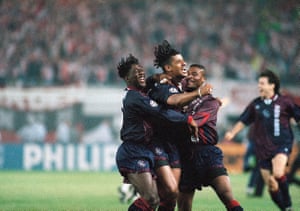
Many of them would replicate it elsewhere. Rijkaard, who retired, and Seedorf were the only immediate departures and Ajax would reach the 1996 final with a team De Boer thinks was “maybe even better”. But they struggled against Juventus, an injury to Overmars hardly helping, and lost on penalties. “If everyone was 100% fit we were unbeatable,” De Boer says.
The Bosman ruling ensured they would never know. By the time Van Gaal left for Barcelona in 1997, half his team had splintered away. Since then, José Mourinho’s Porto are the only side from outside England, Spain, Germany and Italy to win the Champions League.
“It’s still possible, but before it was once a decade and now it’s once in 30 years,” says De Boer, who is now a coach with Ajax’s under-19s and hopes a set of prospects he describes as unbelievable may yet outdo last year’s semi-finalists. Kluivert says of that possibility: “If we are really realistic it will be a more difficult task than what we were faced with.”
But, as those giddy celebrations in Austria taught the match-winner, sometimes football comes up with surprises a human brain can barely imagine.
Additional reporting by Fabrizio Romano



